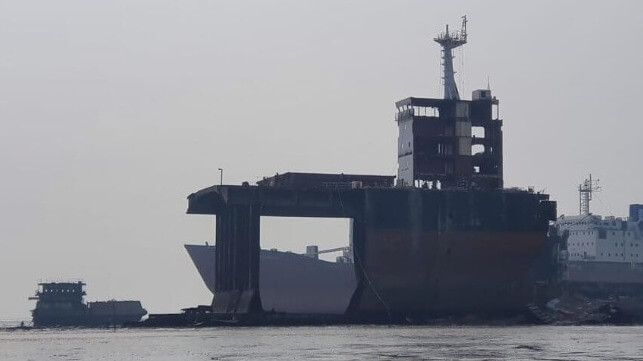South Asian Shipbreaking Soars, But Accidents PREVENTABLE INCIDENTS Continue

PUBLISHED APR 22, 2022 8:06 PM BY THE MARITIME EXECUTIVE
Fatal accidents and injuries continue to characterize shipbreaking in South Asia, where 73 percent of all end-of-life ships were beached for dismantling in the first quarter of this year.
The NGO Shipbreaking Platform reports that a total of 13 workers suffered accidents on South Asia's shipbreaking beaches last quarter, where a total of 94 ocean-going commercial ships and floating offshore units ended up for dismantling. The majority were in India, with 44, followed by Bangladesh with 35 and Pakistan with 15 ships.
Over the three months period from January to March, a total of 129 ships were dismantled globally. 15 were demolished in the European Union, 15 in Turkey and two in China.
Data from market intelligence firm SteelMint Research shows the ship recycling market has maintained its strong performance in the subcontinent where buyers, particularly those from Pakistan and India, are offering attractive prices to secure tonnage.
Shipbreaking import prices rose by $10 per light displacement tonnage (ldt) in India to hit $690 per ldt and $5 per ldt in Bangladesh to reach $675 per ldt in mid-April, with prices in Pakistan holding stable at $690 per ldt.
“Offers from recyclers in Pakistan are going strong at present. In fact, these are topping the price charts in the subcontinent, since shortage of stock in the yards is driving buyers to secure tonnage,” said SteelMint in its latest update.
It added that recyclers in India are eager to buy more tonnage, as domestic demand remains strong while inventory levels at the yards are depleting. This has resulted in offers increasing by about $10 per ldt, and Indian yards are competing hard with those from neighboring Pakistan to secure more vessels.
“Overall, as the second quarter of the year gets well underway, there is more positivity and optimism going forward, primarily due to strong showings on commodity prices and a decent demand for tonnage across sub-continent locations,” noted SteelMint.
As more ships head to South Asian beaches for demolition, cases of fatalities, injuries and breach of safety standards and environmental protection remain rampant. The NGO Shipbreaking Platform report shows that Bangladesh led in reported cases of fatalities and accidents, with two deaths and four injuries. One death was reported in India and three injuries in Pakistan.
The group reports that cases of illegal exports of end-of-life floating storage units (FSOs) and floating production storage and offloading units (FPSOs) into South Asia beaches for dismantling are on the rise, a development that is causing severe negative impacts on the environment.
“In terms of decommissioning, these floating units are subject to the same waste legislation as conventional vessels. Unless end-of-life vessels are decommissioned in a sustainable way, they pose a serious health and environmental risk,” said the report.
It adds that around 200 floating structures have been identified as scrapped globally since 2015 with an estimated 40 percent of the assets ended up on South Asian beaches, where they were broken up under conditions that cause damage to the coastal environment and put workers at risk.
Since 2009, around 7,000 ships have been scrapped in South Asia, resulting in at least 430 deaths and 354 injuries.
No comments:
Post a Comment